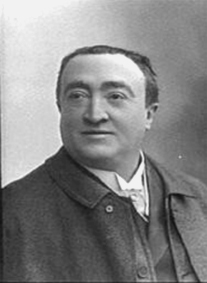José Dupuis
José Dupuis (* 1831 in Liège ; † 1900 in Nogent-sur-Marne ) was a French opera singer ( tenor ).
Life
José Dupuis was born in Liège in 1831 to a Belgian professor. His brother Jacques Dupuis became a well-known violinist. José (actually "Joseph") received his training at the Conservatory in Liège and initially appeared as a lieder singer. In 1854 José Dupuis went to Paris , where he found an engagement at the Théâtre de Luxembourg . He was soon poached by the composer Hervé for his theater, the Folies-Nouvelles . In 1861 he moved to the Théâtre des Variétés .
However, the artist, who was equally talented in singing and acting, only achieved a career breakthrough when he met Jacques Offenbach . He brought out the world premiere of The Beautiful Helena at the Théâtre des Variétés in 1864 and cast José Dupuis in the role of Prince Paris. His lyrical tenor , coupled with his comedic talent, made him the ideal interpreter of the then still young genre of operetta .
In the following years, Dupuis was entrusted with various leading roles in world premieres of Offenbach's works: in 1866 he played the title character in Knight Bluebeard , in 1867 as Fritz in The Grand Duchess of Gerolstein , and in 1868 as Piquillo in La Périchole . In these works he was always the partner of Hortense Schneider , Offenbach's preferred interpreter.
Even after Hortense Schneider stopped working for him, Offenbach continued to compose roles for Dupuis, such as the robber captain Falsacappa in Die Banditen in 1869 or the title role in Le Docteur Ox in 1877 . For the resumption of life in Paris in 1873 he composed a new aria for Dupuis, who sang Baron de Gondremarck. In addition, the tenor took part in the world premieres of Le pont des soupirs (1868), Les Braconniers (1873) and La Boulangère a deux Écus (1875).
In addition, José Dupuis appeared in works by Offenbach's competitors Lecoque and Hervé, as well as in spoken theater pieces by Offenbach's librettists Henri Meilhac and Ludovic Halévy . At the end of his career, from 1894 on, he was still involved in revues and variety events . José Dupuis died in 1900 in the resort of Nogent-sur-Marne near Paris .
literature
- Alexander Faris: Jacques Offenbach. Atlantis-Musikbuch-Verlag 1982
- Heinz-Klaus Metzger, Rainer Rien (editor): Jacques Offenbach. Music Concepts 13, edition text + kritik 1980
- P. Walter Jacob: Jacques Offenbach in personal testimonies and photo documents. Rowohlt Verlag 1986
- Siegfried Kracauer: Jacques Offenbach and the Paris of his time. Suhrkamp Verlag 1994
| personal data | |
|---|---|
| SURNAME | Dupuis, José |
| BRIEF DESCRIPTION | French opera singer (tenor) |
| DATE OF BIRTH | 1831 |
| PLACE OF BIRTH | Liege |
| DATE OF DEATH | 1900 |
| Place of death | Nogent-sur-Marne |
